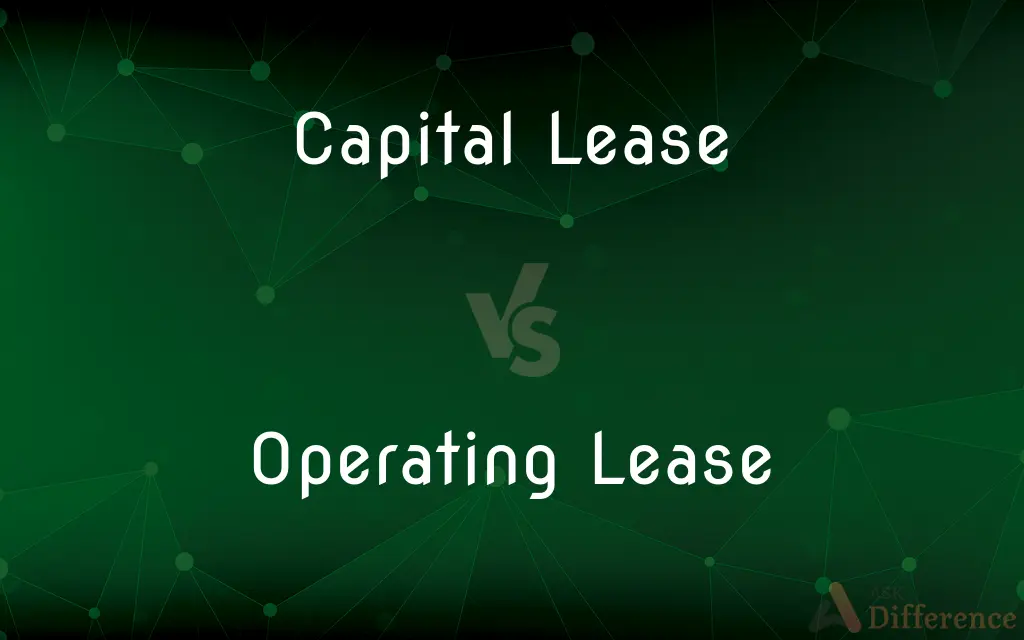Capital Lease vs. Operating Lease — What's the Difference?
Edited by Tayyaba Rehman — By Fiza Rafique — Published on November 16, 2023
A Capital Lease transfers ownership rights and is treated as an asset, while an Operating Lease is a rental agreement with no transfer of ownership.

Difference Between Capital Lease and Operating Lease
Table of Contents
ADVERTISEMENT
Key Differences
A Capital Lease and an Operating Lease are two types of lease agreements, each having unique financial and ownership implications. In a Capital Lease, the lessee essentially buys the asset and pays for it over time, treating it as an owned asset on the balance sheet. Conversely, an Operating Lease is more like a rental agreement, where the lessee simply uses the asset for a period without ownership transfer.
Financially, Capital Leases have a more significant impact on a company's balance sheet. Since the asset is considered owned, both the asset and the corresponding lease obligation are recorded. The interest and principal components of the lease payments are separated for accounting. On the other hand, an Operating Lease does not affect the balance sheet in the same way. The lease payments are treated as operating expenses, and the asset remains off the balance sheet.
From a risk perspective, a Capital Lease shifts more responsibilities to the lessee, including maintenance, taxes, and insurance, since they're considered the asset's owner. With an Operating Lease, the lessor retains many of these responsibilities, given that they still own the asset.
Comparison Chart
Ownership Transfer
Transfers at the end or has a buyout option.
No transfer of ownership.
Balance Sheet Impact
Asset and liability are recorded.
Generally off-balance sheet; treated as an expense.
ADVERTISEMENT
Duration
Usually covers a significant portion of the asset's life.
Shorter term, relative to asset's useful life.
Maintenance and Costs
Lessee's responsibility.
Lessor's responsibility.
End of Lease Options
Buyout, renew, or return.
Typically return or renew.
Compare with Definitions
Capital Lease
A financing method to acquire assets without a large initial cash outlay.
The start-up chose a Capital Lease to procure expensive servers without impacting their cash reserves.
Operating Lease
A short-term lease where the asset returns to the lessor at the end.
The firm decided on an Operating Lease for their fleet of cars, allowing frequent updates.
Capital Lease
A lease that meets specific criteria, making it equivalent to asset purchase.
The CFO determined that the agreement qualified as a Capital Lease due to the buyout option at its end.
Operating Lease
A lease treated as an expense, not affecting the lessee's balance sheet assets.
The Operating Lease ensured that the company's debt-to-asset ratio remained unchanged.
Capital Lease
A long-term lease reflecting ownership on the lessee's balance sheet.
Under the terms of the Capital Lease, the firm could purchase the equipment at the end of the term.
Operating Lease
A lease where the lessor retains responsibilities of asset maintenance and costs.
The Operating Lease for the photocopier included regular maintenance by the supplier.
Capital Lease
A lease agreement that transfers nearly all risks and rewards of ownership.
The company secured a Capital Lease for machinery, allowing them to list it as an asset.
Operating Lease
A rental agreement without any intention or option of ownership transfer.
Their IT equipment was under an Operating Lease, ensuring the latest tech without ownership hassles.
Capital Lease
A lease where the lessee assumes the benefits and drawbacks of ownership.
By opting for a Capital Lease, the company took responsibility for maintenance and insurance.
Operating Lease
A lease agreement that doesn't transfer ownership or risks/benefits of the asset.
Their office space was secured under an Operating Lease, keeping it off the company's balance sheet.
Common Curiosities
Who handles repairs in a Capital Lease?
Typically, the lessee handles repairs since they assume ownership responsibilities.
What determines if a lease is a Capital or Operating Lease?
Criteria like ownership transfer, lease term, and present value of payments determine the lease type.
Do Capital Leases impact a company's debt ratio?
Yes, since the leased asset and corresponding liability are on the balance sheet.
Are Operating Leases always short-term?
Generally, they're shorter than Capital Leases, but not always short-term.
Can an Operating Lease turn into a Capital Lease?
If lease terms change and meet Capital Lease criteria, it can be reclassified.
Can you terminate an Operating Lease early?
It depends on the lease terms, but early termination might incur penalties.
Which lease type offers more flexibility?
Operating Leases usually offer more flexibility in terms and asset updating.
Is the interest in a Capital Lease payment deductible?
Generally, the interest portion of the payment is tax-deductible.
Do all assets qualify for both lease types?
No, certain assets might be more suited for one lease type over the other.
Are there tax implications for each lease type?
Yes, tax treatment varies; Capital Leases can have depreciation and interest deductions, while Operating Leases are treated as expenses.
Share Your Discovery

Previous Comparison
XML vs. XSD
Next Comparison
Parallels vs. MeridiansAuthor Spotlight
Written by
Fiza RafiqueFiza Rafique is a skilled content writer at AskDifference.com, where she meticulously refines and enhances written pieces. Drawing from her vast editorial expertise, Fiza ensures clarity, accuracy, and precision in every article. Passionate about language, she continually seeks to elevate the quality of content for readers worldwide.
Edited by
Tayyaba RehmanTayyaba Rehman is a distinguished writer, currently serving as a primary contributor to askdifference.com. As a researcher in semantics and etymology, Tayyaba's passion for the complexity of languages and their distinctions has found a perfect home on the platform. Tayyaba delves into the intricacies of language, distinguishing between commonly confused words and phrases, thereby providing clarity for readers worldwide.













































